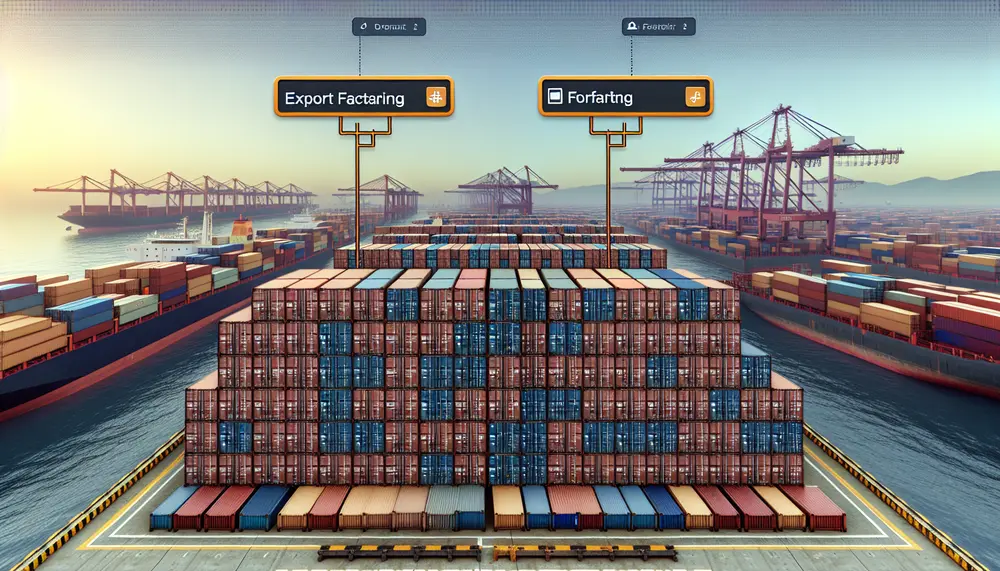Export factoring
Export factoring
What is Export Factoring?
Export factoring is a financial service that helps exporters receive immediate cash by selling their invoices to a third party, called a 'factor'. This process enables businesses to ensure a steady cash flow, which is crucial when waiting for payments from customers located in different countries. By selling their foreign accounts receivable at a discount, companies can invest back into their business without the delay caused by longer payment terms.
How Does Export Factoring Work?
First, an exporter sells goods or services to an overseas customer and issues an invoice. Instead of waiting for the customer to pay, the exporter sells this invoice to a factoring company. The factor then advances a significant percentage of the invoice amount to the exporter, usually within a short time. The remaining balance is held until the overseas customer pays the invoice. Once payment is received, the factor releases the balance to the exporter, minus a fee for the factoring service.
Benefits of Export Factoring
Export factoring offers several advantages. It improves cash flow by providing immediate funds. It reduces the risk of non-payment as factors often provide a credit management service. It allows businesses to handle foreign accounts receivable more efficiently. Lastly, it enables exporters to offer competitive credit terms to their customers, which is often essential in international trade.
Choosing the Right Export Factoring Partner
When looking for an export factoring provider, businesses should consider the factor's experience in international markets, understanding of trade laws, and ability to handle transactions in multiple currencies. The terms and conditions, such as the advance rate, fees, and contract length, are also important to ensure that the partnership is beneficial for the exporter.
Risks and Considerations
While export factoring can be a powerful tool for managing international trade, businesses should be aware of potential risks. These include dependency on the factoring company, costs associated with the service, and the impact of fluctuating exchange rates on the transaction. A thorough assessment of these factors is essential before engaging in an export factoring agreement.
By leveraging export factoring, companies engaged in international trade can navigate the complexities of cross-border transactions with greater ease and financial stability.
Blog Posts with the term: Export factoring

Export factoring is a financial service where businesses sell their invoices to a factor for immediate capital, enhancing cash flow and transferring credit risk in international trade. Forfaiting involves selling longer-term receivables to a forfaiter who assumes all risks, turning...

An Export Factoring Agreement is a financial arrangement where exporters sell their invoices to a factor for immediate cash, easing cash flow and mitigating non-payment risks. It includes services like credit protection, invoice management, and fund advancement; terms vary widely...

Factoring is a financial service where businesses sell their invoices to a third party for immediate funds, improving liquidity and delegating credit control without incurring debt. When choosing a factoring partner, it's crucial to assess credibility through research on history,...

Export factoring provides immediate cash by selling accounts receivable to a factoring company, enhancing liquidity and mitigating international trade risks. It offers benefits like improved cash flow without increasing debt levels, competitive trading terms, credit protection, and saves time on...

A factoring house, or factor, provides businesses with immediate capital by purchasing their accounts receivable at a discount. This service improves cash flow and allows companies to focus on core operations while the factor manages credit assessment and collections; there...

Factoring finance companies in Singapore provide immediate working capital to SMEs by advancing funds on their outstanding invoices, transferring collection responsibilities and reducing administrative burdens. These entities support business growth by improving cash flow management, offering credit protection services, and...

Export factoring without recourse is a financial service where exporters sell their invoices to a factor who assumes all credit risks, ensuring the exporter gets paid even if the overseas customer defaults. This arrangement boosts cash flow and reduces administrative...

Export factoring is a financial service where businesses sell their international invoices to a factor for immediate cash, mitigating risks like non-payment and improving liquidity. It involves an exporter selling accounts receivable at a discount to the factoring company, which...

Factoring companies address cash flow challenges by purchasing unpaid invoices, providing immediate liquidity to businesses across various industries. Their growth stems from evolving services like credit checks and payment collection, making them vital financial partners for SMEs and larger corporations...

Export factoring is a financial tool used in international trade where companies sell their accounts receivable to a factor for immediate cash, improving liquidity and mitigating risks like customer insolvency. It offers benefits such as reduced administrative costs, access to...

Nonrecourse export factoring is a financial service where businesses sell their international invoices to a factoring company, which assumes the risk of non-payment if the foreign customer defaults. This tool improves cash flow and reduces credit risks for exporters, allowing...

Factoring is a financial transaction where businesses sell their invoices to a third party at a discount for immediate cash, improving liquidity without incurring debt. It comes in various forms like recourse and non-recourse factoring, each with different risk profiles...

Debt factoring in France has evolved into a vital financial tool, offering businesses immediate liquidity, mitigating risks, and fostering growth through innovation. Its adaptability to digital transformation and cross-border opportunities positions it as a strategic enabler for both domestic stability...

ICICI Bank's export factoring services provide businesses with immediate cash flow by purchasing overseas invoices, reducing payment risks and administrative burdens while offering tailored financial solutions for various business sizes....
